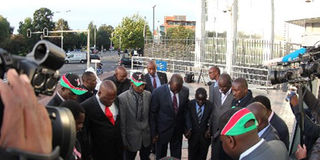Kenyan MPs criticise activists over ICC stand

BILLY MUTAI| NATION
MPs pray with Deputy President William Ruto and his co-accused, Mr Joshua arap Sang, outside ICC on October 2. Kenyan MPs have criticised civil society organisations for their stand against amendments to the Rome Statute to shield sitting heads of states from prosecution.
Kenyan MPs have criticised civil society organisations for their stand against amendments to the Rome Statute to shield sitting heads of states from prosecution.
Speaking on Friday evening after the Assembly of State Parties meeting in The Hague, the MPs said the activists should have stayed quiet during the debate.
Kenya is seeking amendments to allow those charged at the International Criminal Court attend trial through video link and to provide immunity against the prosecution of sitting presidents.
Kasarani MP Mr John Njoroge Chege, Kiharu MP Mr Irungu Kangari, MP for Dadaab Mr Mohammed Abdi, and former MP for Garsen Mr Danson Mungatana were among those who briefed the media after the ASP debate.
“The activists were arguing about unsettled victims of 2007 post-election violence, yet 95 per cent of them have been compensated and settled,” Mr Chege said.
Mr Mungatana questioned the activists’ statements against Kenya’s stand on indictment of heads of states.
He said the country was supposed to express unity at a time when its head of state was facing trial by the ICC.
International criminal law analysts have, however, regarded Kenya’s proposals on amending the Statute to favour an individual as self-serving.
The Prosecutor of the International Criminal Tribunal for the former Yugoslavia (ICTY) Mr Serge Brammerts said Kenya’s case is not any different from other cases that have been handled by international courts.
“It is quite hard to change the Statute to suit a specific head of state because this will cause immunity to heads of state and help spread impunity,” Mr Brammerts said.
CREATE LOCAL TRIBUNALS
He advised the ICC to assist member states of the Rome statute to create local tribunals to ease trial procedures.
Former president of the Assembly of State Parties of the Rome Statute, Mr Christian Wenaweser, said Kenya’s proposal as presented at the ASP was farfetched.
“The process to have the Statute amended is rigorous and will not yield any results,” Mr Wenaweser said. “The Statute cannot be changed overnight because of a head of state.”
Mr Wenaweser said that the case would only be considered if the amendments are ratified by 87.5 per cent of the 122 member states of the International Criminal Court.
The amendments would then only come into effect one year after the 106 countries deposit their ratification instruments, according to the Rome Statute.
According to Kenya, the proposals would allow for effective and efficient functioning of the court.
Attorney General Githu Muigai on Thursday told the ASP conference that they should consider the proposals because the indictment of Kenya’s head of state would negatively affect Kenya’s growth and the constitution.
The ICC has, however, complained about the haste with which proposals for amendments to the Rome Statute have been introduced
Such proposals require three months’ notice, which has not happened in the Kenya case.





